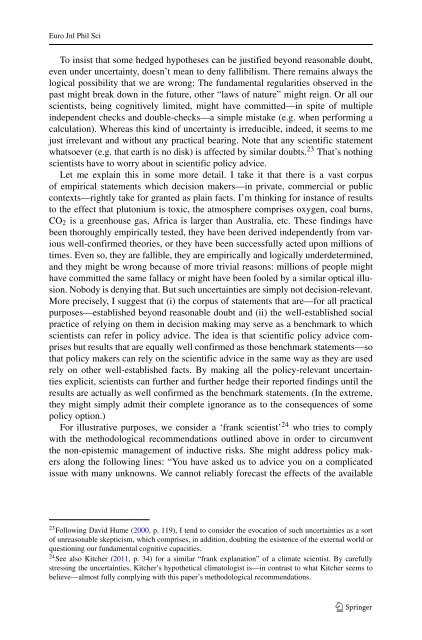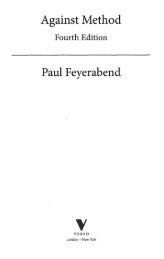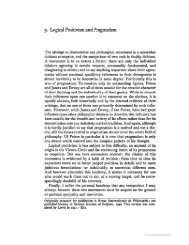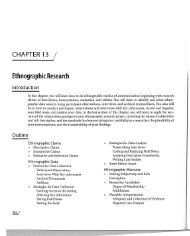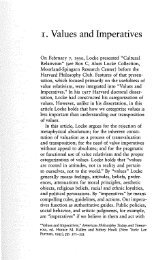In defence of the value free ideal
In defence of the value free ideal
In defence of the value free ideal
- No tags were found...
Create successful ePaper yourself
Turn your PDF publications into a flip-book with our unique Google optimized e-Paper software.
Euro Jnl Phil SciTo insist that some hedged hypo<strong>the</strong>ses can be justified beyond reasonable doubt,even under uncertainty, doesn’t mean to deny fallibilism. There remains always <strong>the</strong>logical possibility that we are wrong: The fundamental regularities observed in <strong>the</strong>past might break down in <strong>the</strong> future, o<strong>the</strong>r “laws <strong>of</strong> nature” might reign. Or all ourscientists, being cognitively limited, might have committed—in spite <strong>of</strong> multipleindependent checks and double-checks—a simple mistake (e.g. when performing acalculation). Whereas this kind <strong>of</strong> uncertainty is irreducible, indeed, it seems to mejust irrelevant and without any practical bearing. Note that any scientific statementwhatsoever (e.g. that earth is no disk) is affected by similar doubts. 23 That’s nothingscientists have to worry about in scientific policy advice.Let me explain this in some more detail. I take it that <strong>the</strong>re is a vast corpus<strong>of</strong> empirical statements which decision makers—in private, commercial or publiccontexts—rightly take for granted as plain facts. I’m thinking for instance <strong>of</strong> resultsto <strong>the</strong> effect that plutonium is toxic, <strong>the</strong> atmosphere comprises oxygen, coal burns,CO 2 is a greenhouse gas, Africa is larger than Australia, etc. These findings havebeen thoroughly empirically tested, <strong>the</strong>y have been derived independently from variouswell-confirmed <strong>the</strong>ories, or <strong>the</strong>y have been successfully acted upon millions <strong>of</strong>times. Even so, <strong>the</strong>y are fallible, <strong>the</strong>y are empirically and logically underdetermined,and <strong>the</strong>y might be wrong because <strong>of</strong> more trivial reasons: millions <strong>of</strong> people mighthave committed <strong>the</strong> same fallacy or might have been fooled by a similar optical illusion.Nobody is denying that. But such uncertainties are simply not decision-relevant.More precisely, I suggest that (i) <strong>the</strong> corpus <strong>of</strong> statements that are—for all practicalpurposes—established beyond reasonable doubt and (ii) <strong>the</strong> well-established socialpractice <strong>of</strong> relying on <strong>the</strong>m in decision making may serve as a benchmark to whichscientists can refer in policy advice. The idea is that scientific policy advice comprisesbut results that are equally well confirmed as those benchmark statements—sothat policy makers can rely on <strong>the</strong> scientific advice in <strong>the</strong> same way as <strong>the</strong>y are usedrely on o<strong>the</strong>r well-established facts. By making all <strong>the</strong> policy-relevant uncertaintiesexplicit, scientists can fur<strong>the</strong>r and fur<strong>the</strong>r hedge <strong>the</strong>ir reported findings until <strong>the</strong>results are actually as well confirmed as <strong>the</strong> benchmark statements. (<strong>In</strong> <strong>the</strong> extreme,<strong>the</strong>y might simply admit <strong>the</strong>ir complete ignorance as to <strong>the</strong> consequences <strong>of</strong> somepolicy option.)For illustrative purposes, we consider a ‘frank scientist’ 24 who tries to complywith <strong>the</strong> methodological recommendations outlined above in order to circumvent<strong>the</strong> non-epistemic management <strong>of</strong> inductive risks. She might address policy makersalong <strong>the</strong> following lines: “You have asked us to advice you on a complicatedissue with many unknowns. We cannot reliably forecast <strong>the</strong> effects <strong>of</strong> <strong>the</strong> available23 Following David Hume (2000, p. 119), I tend to consider <strong>the</strong> evocation <strong>of</strong> such uncertainties as a sort<strong>of</strong> unreasonable skepticism, which comprises, in addition, doubting <strong>the</strong> existence <strong>of</strong> <strong>the</strong> external world orquestioning our fundamental cognitive capacities.24 See also Kitcher (2011, p. 34) for a similar “frank explanation” <strong>of</strong> a climate scientist. By carefullystressing <strong>the</strong> uncertainties, Kitcher’s hypo<strong>the</strong>tical climatologist is—in contrast to what Kitcher seems tobelieve—almost fully complying with this paper’s methodological recommendations.


